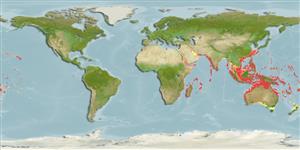Common names from other countries
Environment: milieu / climate zone / depth range / distribution range
Ecologie
marien rifbewoner; standvastig; diepte 5 - 210 m (Ref. 9710), usually 5 - 30 m (Ref. 90102). Subtropical; 30°N - 30°S
Indo-Pacific: Red Sea and South Africa to warm-temperate Australia and the Hawaiian Islands.
Grootte / Gewicht / Leeftijd
Maturity: Lm ? range ? - ? cm
Max length : 21.0 cm TL mannelijk / geslacht onbekend; (Ref. 48636)
Dorsale stekels (totaal): 12 - 13; Dorsale zachte stralen (totaal): 23-25; Anale stekels 3; Anale zachte stralen: 17 - 19.
Occur primarily along outer reef slopes, in current channels. Juveniles in aggregations around isolated patch reefs, adults in large schools well above the bottom (Ref. 9710). In Indonesia, adults most common in depth 40-50 m, reported to 200 m (Ref. 48636). Benthopelagic (Ref. 58302). Feed on plankton. Juveniles may act as cleaners (Ref. 9710); also observed in adults (Ref. 48636). Oviparous (Ref. 205). Form pairs during breeding (Ref. 205).
Levenscyclus en paargedrag
Maturiteit | Voortplanting | Paaien | Eieren | Fecunditeit | Larven
Form pairs during breeding (Ref. 205).
Myers, R.F., 1991. Micronesian reef fishes. Second Ed. Coral Graphics, Barrigada, Guam. 298 p. (Ref. 1602)
Status op de Rode Lijst van het IUCN (Ref. 130435)
CITES (Ref. 128078)
Not Evaluated
Gevaar voor de mens
Harmless
Gebruik door de mens
Visserij: van geen belang; Aquarium: Commercieel
Meer informatie
ReferentiesAquacultuurAquacultuurprofielKweeklijnenGeneticaElectrophoresesErfelijkheidZiektesVerwerkingMassaconversie
Tools
Speciale rapporten
Download XML
Internetbronnen
Estimates based on models
Preferred temperature (Ref.
115969): 19.1 - 28.1, mean 26.1 (based on 501 cells).
Fylogenetische diversiteitsindex (Ref.
82804): PD
50 = 0.5039 [Uniqueness, from 0.5 = low to 2.0 = high].
Bayesian length-weight: a=0.02239 (0.01117 - 0.04486), b=3.02 (2.85 - 3.19), in cm Total Length, based on LWR estimates for this (Sub)family-body shape (Ref.
93245).
Trofisch niveau (Ref.
69278): 3.3 ±0.40 se; based on food items.
Weerstandsvermogen (Ref.
120179): Hoog, minimale populatieverdubbelingstijd minder dan 15 maanden (Preliminary K or Fecundity.).
Fishing Vulnerability (Ref.
59153): Low vulnerability (11 of 100).
